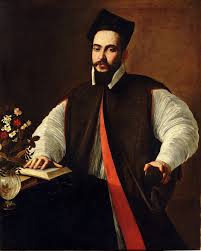Papal Sorceror? July 19, 2014
Author: Beach Combing | in : Modern , trackback
***Thanks to an old friend of the blog, Stephen D. for this one***
Urban VIII (obit 1644) was one of the most exquisitely cultured popes ever to sit on the throne of Peter. He is famous today for being the man who brought Galileo to Rome to rap his knuckles very hard: but that is in some ways unfair to an elegant Renaissance politicker and fixer who could write, when he put his mind to it, fine Latin verse, and quote Virgil and Horace with the best of them. Given his ‘cultured’ early seventeenth century existence – this is a portrait by Caravaggio above – it is perhaps not that surprising that Urban was, like so many scholars in Renaissance Italy, something of a New Ager. He loved astrology and loved charting the zodiacs of friends and enemies. He also employed ceremonial magic.
His acts of ceremonial magic seem to have begun in 1626 and these were inspired by several coming eclipses: a lunar and solar eclipse in 1628 and a solar eclipse in 1630: it tells us a lot about this brave new world that by then eclipses were being routinely predicted and yet that the same men doing the predicting were resorting to magic to avoid evil influences.
Some of Urban’s enemies – the Spanish faction in Rome loathed him – had claimed that he would die on an eclipse and Urban was planning ahead. He even called in Tommaso Campanella, a Neo-Platonic philosopher (aka heretic, who had to be sprung from jail for the purpose). Then the fun really began.*
They sealed the doors and windows of a Vatican apartment to prevent the infiltration of outside air and hung white silken cloths on the walls. They sprinkled the room with rose vinegar and other aromatics and then lit two candles and five torches representing the seven planets. All the other persons present had horoscopes immune to the evils of the eclipse. They played music attuned to the harmony of the planets Venus and Jupiter, employed appropriate stones, plants and odors, and drank astrologically distilled liquids.
Campanella was a Dominican friar gone bad. He had been thrown in prison the first time in part because of his belief that wives could be shared and because he spat on the name of Aristotle, a more excusable quirk. He remained as Urban’s astrologer until 1630 before fleeing to France and finding refuge with Richelieu.
We have had papal orgies and there is at least one pope who didn’t believe in God (another post another day), but Papal magic? Any other examples? Drbeachcombing at yahoo DOT com
*John G Burke, “Hermetism as a Renaissance world view”, in “The Darker Vision of the Renaissance”, ed. Robert S Kinsman. University of California Press, 1975, p. 105.


